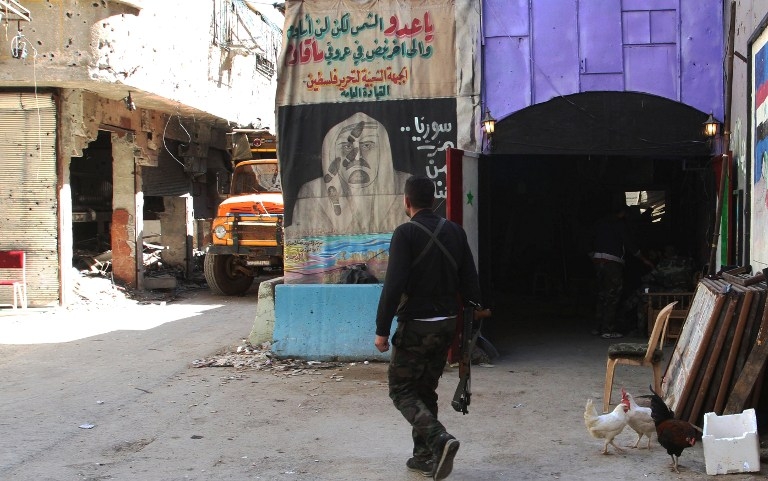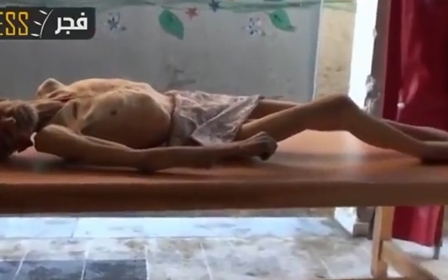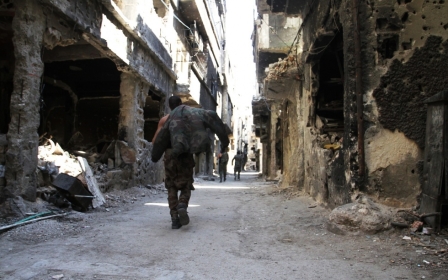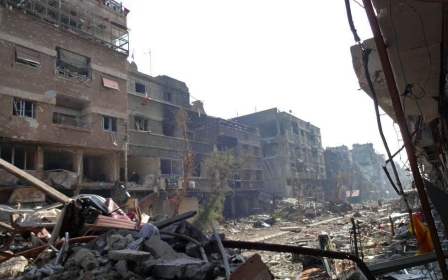Syrians negotiate deal to end Yarmouk camp siege

A deal between the Syrian government and rebels could see thousands of fighters and their families leave areas in and around the Yarmouk Palestinian refugee camp in Damascus, said a monitoring group on Thursday.
The deal, which is still being negotiated and could commence as early as Saturday, was confirmed by a United Nations official speaking to Al Jazeera, who stressed that the UN is an "observer" but not a broker of the agreement.
The deal could see a number of Islamic State (IS) militants given safe passage out of the camp to their stronghold of Raqqa or other destinations.
The UN says there are 18,000 people besieged by the Syrian government of President Bashar al-Assad in Yarmouk camp, who are in urgent need of aid.
Armed groups inside the camp include various Syrian rebels as well as IS militants and members of the al-Qaeda-linked al-Nusra Front. It also includes pro- and anti-Assad Palestinian fighters.
New peace talks in Geneva
Meanwhile, the Syrian government said on Thursday it was ready to take part in new talks in Geneva aimed at ending the war, but appeared to make its participation conditional on which opposition groups attend.
Foreign Minister Walid Muallem said Damascus "is ready to participate in the Syrian-Syrian dialogue in Geneva without any foreign interference".
Last week, the UN Security Council unanimously adopted a resolution endorsing a proposed peace plan to bring the regime and opposition together for talks in January.
The plan is the result of nearly two months of strenuous efforts among top diplomats from 17 countries, including Assad backers Russia and Iran.
But it does not address the sharpest difference between opposition groups and the government: the fate of Assad.
Assad's preconditions
Muallem's comments seemed to indicate government approval of the plan - but with apparent preconditions.
He said Syria was waiting to receive a list of "terrorist organisations" that would not be allowed to participate in the talks.
The UN tasked Jordan with creating the blacklist, which was submitted on Friday and apparently included IS and the al-Qaeda-linked al-Nusra Front.
Syria's government has systematically referred to all its opponents, including non-Islamist groups, as "terrorists".
A landmark summit in Saudi Arabia earlier this month saw armed and political branches of the opposition agree to talks with Assad's government.
An opposition delegation to future peace negotiations is expected to include the factions present in Riyadh, as well as other groups on the ground in Syria.
'Unity government' vs. 'transitional body'
The UN resolution calls for talks in early January that would lead to the "establishment of an inclusive transitional governing body with full executive powers" within six months.
But Muallem referred only to an eventual "national unity government".
He said Damascus would "compose a constitutional committee to look for a new constitution with a new law of election so the parliamentary election will be held within the period of 18 months, more or less".
The UN resolution was received coolly by Syrian opposition forces, including the main group in exile, the Istanbul-based National Coalition.
Kurdish-Arab alliance against IS
Previous efforts to negotiate a political solution to the nearly five-year conflict have faltered, including the 2014 Geneva talks between the pro-Assad and opposition forces.
On the ground, government air raids killed 10 children among 28 civilians in the rebel-held area of Eastern Ghouta near Damascus, said the Observatory.
Kurdish militia and Arab rebel groups have been chipping away at IS territory near Raqqa, the militant organisation's de facto Syrian capital.
On Thursday, an alliance of Kurdish and Arab rebels drove IS fighters back on the eastern bank of the Euphrates River in the northern province of Aleppo, its spokesman told AFP.
New MEE newsletter: Jerusalem Dispatch
Sign up to get the latest insights and analysis on Israel-Palestine, alongside Turkey Unpacked and other MEE newsletters
Middle East Eye delivers independent and unrivalled coverage and analysis of the Middle East, North Africa and beyond. To learn more about republishing this content and the associated fees, please fill out this form. More about MEE can be found here.




